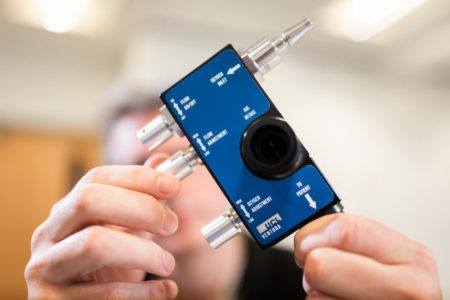

A breathing aid developed with the assistance of Mercedes-AMG High Performance Powertrains (HPP) is set to be delivered for clinical trials in the United Kingdom.
HPP has played a part in developing a Continuous Positive Airway Pressure (CPAP) device in response to the global COVID-19 pandemic.
Reports from Italy have indicated approximately half of patients given CPAP have avoided the need for invasive mechanical ventilation.
In under two weeks engineers at University College London (UCL) and HPP, and clinicians at University College London Hospital (UCLH), have worked to reverse engineer and improve an off-patent device with 100 of the devices now set to be delivered.
“These devices will help to save lives by ensuring that ventilators, a limited resource, are used only for the most severely ill,” explained UCLH critical care consultant, Professor Mervyn Singer.
“While they will be tested at UCLH first, we hope they will make a real difference to hospitals across the UK by reducing demand on intensive care staff and beds, as well as helping patients recover without the need for more invasive ventilation.”
CPAP machines are routinely used by the NHS to support patients in hospital or at home with breathing difficulties.
They work by pushing an air-oxygen mix into the mouth and nose at a continuous rate, keeping airways open and increasing the amount of oxygen entering the lungs.
Invasive ventilators deliver breaths directly into the lungs, but require heavy sedation and connection to a tube placed into the patient’s trachea
Managing Director of Mercedes-AMG HPP, Andy Cowell, added: “The Formula One community has shown an impressive response to the call for support, coming together in the ‘Project Pitlane’ collective to support the national need at this time across a number of different projects.
“We have been proud to put our resources at the service of UCL to deliver the CPAP project to the highest standards and in the fastest possible timeframe.”
Project Pitlane is a collective of UK-based Formula 1 teams and their respective technology arms coordinating a response to the UK government’s call for assistance with the manufacture of medical devices.





















Discussion about this post